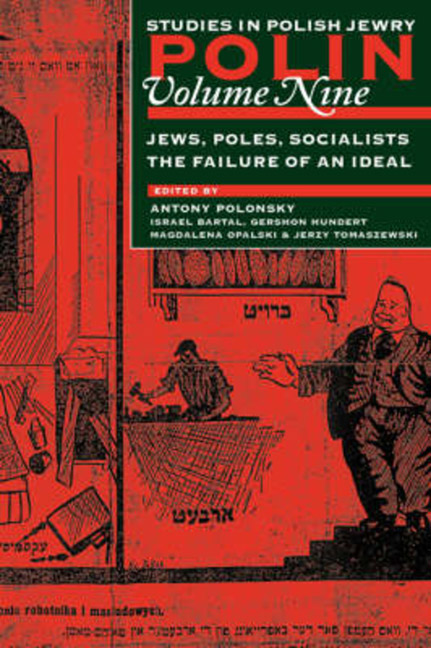Book contents
- Frontmatter
- Dedication
- Editors and Advisers
- Preface
- Acknowledgement
- Polin
- Polin: Studies in Polish Jewry
- Contents
- Note on Transliteration, Names, and Place Names
- Abbreviations
- Introduction
- PART I POLES, JEWS, SOCIALISTS: THE FAILURE OF AN IDEAL
- PART II NEW VIEWS
- PART III REVIEWS
- REVIEW ESSAYS
- BOOK REVIEWS
- Bibliography Of Polish-Jewish Studies, 1993
- Notes on Contributors
- Notes on Translators
- Glossary
- Index
Introduction
- Frontmatter
- Dedication
- Editors and Advisers
- Preface
- Acknowledgement
- Polin
- Polin: Studies in Polish Jewry
- Contents
- Note on Transliteration, Names, and Place Names
- Abbreviations
- Introduction
- PART I POLES, JEWS, SOCIALISTS: THE FAILURE OF AN IDEAL
- PART II NEW VIEWS
- PART III REVIEWS
- REVIEW ESSAYS
- BOOK REVIEWS
- Bibliography Of Polish-Jewish Studies, 1993
- Notes on Contributors
- Notes on Translators
- Glossary
- Index
Summary
… the less antisemitism will exist among Christians, the easier it will be to unite the social forces … and the sooner a workers’ solidarity will emerge: a solidarity of all who are exploited and wronged. Jew, Pole, Lithuanian, we are equally exploited … we are all equally wronged by Moscow … Let us encourage Jewish comrades whenever we meet them.
JÓZEF PLŁSUDSKI, ‘Kwestia Żydowska na Litwie’, Walka (November 1903)THIS pious hope, expressed by the man who was probably the dominant figure in Polish politics in the first half of the twentieth century and who was himself a Socialist at the beginning of his political career, when he wrote the article from which the quotation is taken, sums up the theme of this volume. A great deal of work has been done on the relationship between the Jews and the Socialist movement in the German-speaking lands. Works like Robert Wistrich's Socialism and the Jews: The Dilemmas of Assimilation in Germany and Austria (East Brunswick, NJ, 1982) and Jack Jacob's On Socialists and ‘The Jewish Question’ after Marx (New York, 1992) have illuminated questions such as the attitude of the Socialist movement and its principal ideologists towards the ‘Jewish Question’ and towards the development of political antisemitism and the reasons for the widespread support given by Jews in Germany and Austria-Hungary to Socialist parties in conditions in which this seemed to go against their economic interests.
Much less research has been undertaken into these problems in the Polish lands. In the period of Communist rule this was for a long time a taboo topic. When censorship began to relax, attention was concentrated on the vexed question of the role of the Jews in the Communist movement and in the Communist regime after 1944, particularly in its early years. This was also the main topic which interested émigré scholars. Some important work was done in the area including Paul Lendvai'sAntisemitism in Eastern Europe (London, 1971), Michał Chęciński's Poland: Communism, Nationalism, Anti-semitism (New York, 1982), Jaff Schatz's The Generation: The Rise and Fall of the Generation of Jewish Communists in Poland (Berkeley, 1991), and particularly Krystyna Kersten's Polacy, Zydzi, Komunizm (Warsaw, 1991).
- Type
- Chapter
- Information
- Jews, Poles, Socialists: The Failure of an Ideal , pp. xvii - xxiiPublisher: Liverpool University PressPrint publication year: 2008

